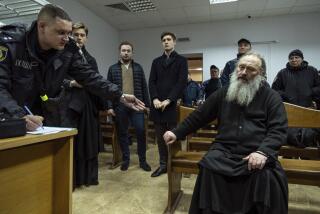RUSSIA : Evicted and Reviled, Mormons in Moscow Carry On With Mission
- Share via
MOSCOW — When the Mormons first came to the Russian capital about five years ago, city authorities gave the preachers from Utah what seemed an appropriate place to hold their prayer meetings: rooms in a ramshackle former Russian Orthodox monastery, closed decades before by the Soviet government.
But as the strictures of communism fell away in the aftermath of the Soviet collapse, Russians were again permitted freedom of worship and, in 1993, President Boris N. Yeltsin returned religious buildings to the Orthodox Church.
As a new mother superior began rebuilding the Zachatyevsky monastery, the bewildered Mormons found they were suddenly personae non gratae inside the little religious center’s stone walls.
“It got difficult to be there, so we moved out as soon as we could--but not fast enough for the mother superior, who complained about us to the city authorities,” said Donald K. Jarvis, the soft-spoken president of the Mormon mission in Moscow. “But we certainly didn’t want to be discourteous.”
The Orthodox Church, focus of Russian nationalist sentiment, views all foreign churches as competitors vying to fill the vacuum of belief left by the collapse of communism. Because foreign preachers are richer, the church says, they have an unfair advantage. It is lobbying Yeltsin to have them eased out.
So the polite missionaries, instantly identifiable in their neat, short-sleeved white shirts, now hold their prayer meetings in another Moscow building and hope to build a small chapel on the edge of town within the next three years.
All perhaps part of the rough-and-tumble of setting up home in chaotic new Russia. But the 114-strong Mormon mission here has also found itself in the firing line of a more devastating public attack, this time from Yeltsin’s tough-talking new security boss, Alexander I. Lebed.
In the heat of a presidential election that saw the relatively pro-Western Yeltsin reelected despite a surge of xenophobic anti-Western feeling, Lebed railed last month against foreign religious groups working in post-Soviet Russia, calling the Mormons “scum” and “mold” and lumping them together with the extremist Japan-based sect Aum Supreme Truth, which has been linked to terrorist activity.
It was clear why Lebed might resent foreign churches in general. But it remains a mystery what Russia’s new strongman has against the Church of Jesus Christ of Latter-day Saints, seen as a law-abiding group of 10 million worshipers in 156 countries.
The Mormon Church--one of 54 religious organizations officially registered at the Russian Justice Ministry--has done nothing worse in Russia than distribute thousands of tons of aid, run relief programs worth $14.5 million and convert about 5,000 new believers from five missions.
After days of international uproar over his attack, Lebed grudgingly said he had not intended to offend the Mormons. But, he asked with no visible display of remorse, how would they feel if Russia launched an “air raid” of Orthodox clergy on the Mormon center at Salt Lake City?
Some fear that Lebed’s savaging of the Mormons is a sign that anti-Western nationalism has moved into mainstream Russian politics. Others call it simply proof of the ex-general’s lack of sophistication.
“It is quite possible . . . that he confused the Mormons and the Masons,” quipped Lebed rival Anatoly B. Chubais, a leading liberal reappointed to government this week as Kremlin chief of staff. “Such things happen.”
The Mormons themselves are turning the other cheek. Jarvis says there are enough people in post-Soviet Russia who believe in freedom of conscience--and who are ready to uphold an open society whose leaders do not dictate what the people believe--to counteract any threat in Lebed’s words.
For him, the real problem of working in Russia lies elsewhere. As Russians get richer, they are coming to care more about the pleasures of this world--houses, cars and spas--than those of the next, and are growing less likely to seek out Mormon teachings, he said.
“There’s no question it’s harder. . . . Moscow is getting more and more distressingly like a normal Western European city, where you have to do some work finding people,” he said. “It’s not the golden era it was when we came in 1991 and 1992.”
More to Read
Sign up for Essential California
The most important California stories and recommendations in your inbox every morning.
You may occasionally receive promotional content from the Los Angeles Times.













